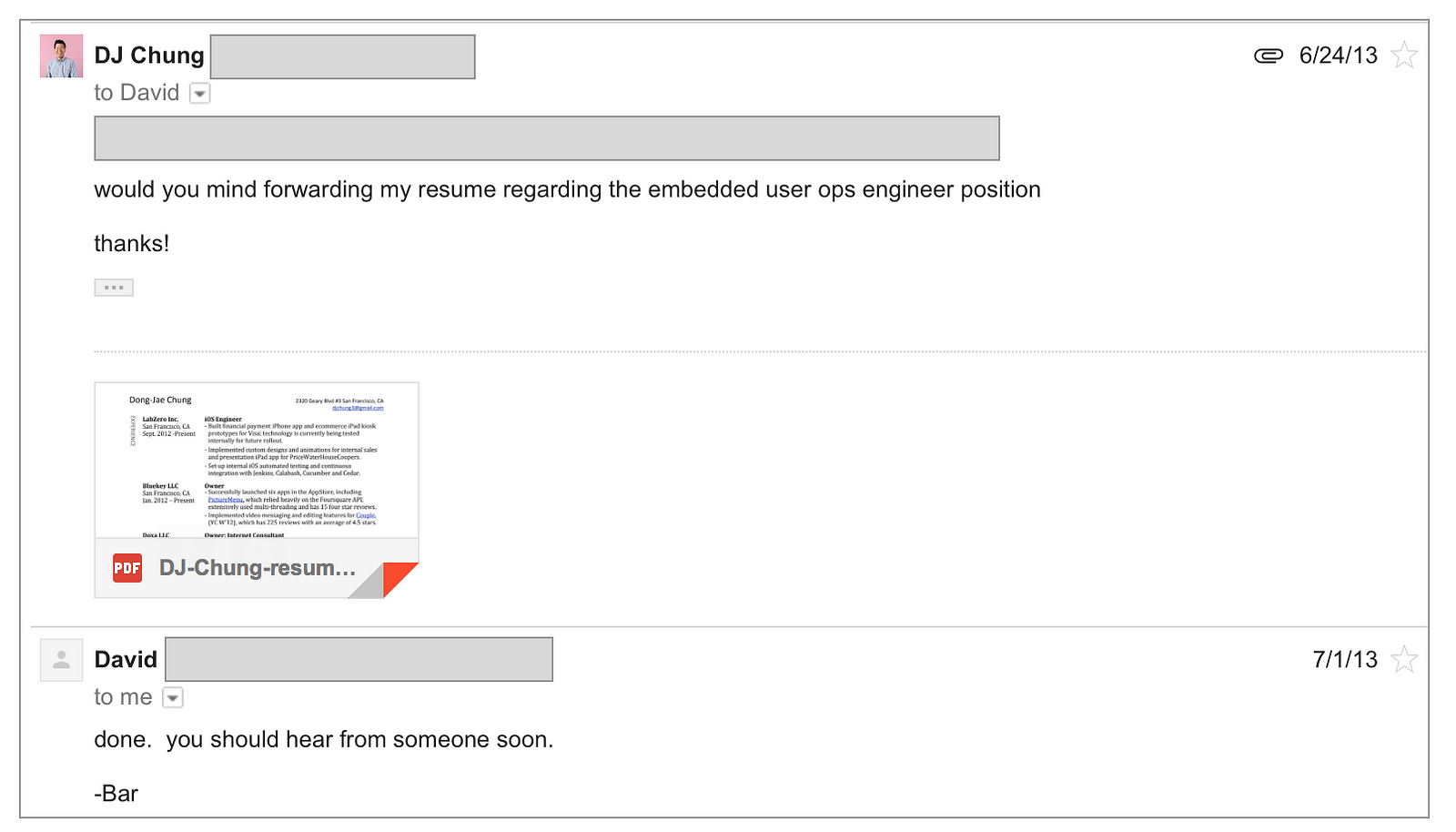By DJ Chung
Medium.freecodecamp.org —
During the job search, you’re going to be asking people for help. Whether it’s for advice, a referral, or making an introduction to someone. You are going to be asking at least one other person for a favor.
I got my job at Dropbox by asking for a favor, a referral. Here’s the email I sent to my friend, David, (after multiple conversations!) to ask him to submit my resume:

Sometimes, you’re asking a close friend and it’s easy to do (although I know this is not always the case). But other times, you’re reaching out to someone you don’t know very well or even a complete stranger. That can be stressful and awkward.
Make it easy for people to help you
Here are some tips to keep in mind when you’re reaching out to people over email or a message for help with your job search.
1. Do your research
Don’t ask questions you can find answers to with a little effort. If your question can be answered by Googling, reading that person’s blog, or looking through their LinkedIn profile, it’s not a good question to ask.
Also, if you’re reaching out to someone you don’t know, asking a generic question with an answer widely available will make it less likely that you’ll get a response.

2. Have a very specific ask
Stay away from generic questions like, “How did you work your way up to become the Director of Business Development?”
This type of question is hard to answer because it’s so broad and will take a lot of effort to put together a thoughtful response. Rather, ask, “What’s one skill you actively worked on that helped you become the Director of Business Development?”
Also, a question like, “Would you connect me with someone in Marketing?” is not specific enough. Again, do your research and find someone on LinkedIn in a marketing position at the company and ask, “I saw you were connected with Lisa Stevens on LinkedIn, would you be willing to connect me with her? If she’s not the right person to speak to, would you be willing to connect me with someone else in Marketing?”
One specific scenario I want to call out is when you send a cold message to someone you don’t know. Maybe it’s someone at a company you’re interested in and you would like a referral from them. Or, maybe they’re in your dream job and you want to learn more about how they got there.
As always, and especially in these cold message scenarios, keep in mind that you’re asking a stranger, who is a real human being, a favor, so be tactful.
In your initial cold message, try to establish a connection with a quick intro about yourself and a small ask.
Let’s say you’re cold messaging (through email or LinkedIn) someone who is in a role you aspire to be in. You could send a first message like:
Hey X,
I saw your technical blog post on [Company Y] site and found it fascinating! Those are the types of problems I want to be solving as well.
I’m currently a software engineer early in my career and have been thinking about how to increase my rate of learning to eventually become a tech lead like you.
Would you be willing to chat on the phone for 30 min or grab coffee? I’d love to run some specific questions by you.
Thank you!
I want to highlight a few things about this cold message. First of all, it shows you’ve done your research as you point out a blog post they’ve written. Find something about the person you can relate to and compliment them, as it helps warm up the cold message.
Second, it gives a short background about yourself. This helps give more context about who you are. Resist writing out your life story, though — now is not the time.
Third, you have a specific ask: to chat on the phone or grab coffee. In addition, you mention what you want to talk to them about and that you’ll be prepared with specific questions to ask.
These little nuances go a long way towards helping the recipient understand what is being asked of them. If there is no ask or not a clear ask, it takes work for the recipient to figure out what needs to be done, and in these scenarios, you probably won’t get a response.
Sometimes, you may get a response declining your invitation to chat on the phone or grab coffee, but the person may offer to answer your questions over email. Take them up on the offer and send over the questions you’ve prepared, but keep the next tip in mind.
3. Rule of 3: only ask 3 questions
No one wants to open an email or message with a wall of text. Resist the urge to ask every single question you have for this person at one time.
Instead, as a rule, only ask 3 questions at a time. Also, to reiterate, ask researched and/or specific questions so that answers don’t need to be very long. Just because an answer is short doesn’t mean it wasn’t well thought out.
This is especially important when you’re reaching out to someone for career advice. Career advice questions tend to be very broad and cumbersome to answer because they need a back story. Rather, aim to ask questions that get at the essence of the matter at hand rather than ones that require descriptive context.
Here are examples of these types of questions related to career development:
- Are there books, blogs, or other resources that have significantly helped you improve your software engineering skills?
- Is there a practice or habit that has helped you become more effective at your work, and that you wished you had started doing earlier in your career?
These types of questions make it more likely that you’ll get a timely response. And plus, a back and forth exchange can lead to a mutually beneficial relationship rather than a one time interaction.
Also, make sure you don’t forget to ask for what you want. In the spirit of establishing a warm connection, don’t just make up questions for the sake of asking questions. For instance, if you’re looking for a job referral, make sure you specifically ask (once you’ve established a warm connection), “would you refer me to this role?”

4. Give time ranges when setting up logistics
If you’re requesting to grab coffee or chat on the phone, give multiple dates and time ranges of your availability.
Do not ask, “When are you free?” But ask, “I’m free Thursday between 3 pm and 6 pm or Friday between 1 pm and 3 pm. If none of these times work for you, what are some times that do?”
This way, they can choose a slot that works for them instead of going back and forth trying to figure out logistics, which as we all know, is the worst.
During the job search, we’re going to need help, but let’s do what we can to make it easy for folks to help us!
Originally published at hackcareer.com.











